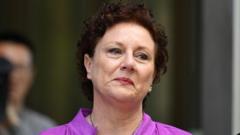Kathleen Folbigg, wrongfully imprisoned for two decades, faces backlash after a government offer of A$2 million, seen as insufficient by her legal representatives and public advocates.
Kathleen Folbigg's Compensation Offer Sparks Controversy Over Justice System

Kathleen Folbigg's Compensation Offer Sparks Controversy Over Justice System
Debate ignites as advocates decry the government's compensation decision for victim of wrongful incarceration.
Kathleen Folbigg, once labeled "Australia's worst mother," was recently cleared of the wrongful conviction related to the deaths of her four children, a case now recognized as a profound miscarriage of justice. Although a judicial review concluded that her babies likely perished due to unforeseen genetic conditions rather than foul play, the Australian government has proposed a compensation package of A$2 million (£975,580, $1.3 million), which many consider deeply inadequate given her twenty-year ordeal in prison.
Legal experts had anticipated that the compensation could exceed A$10 million, making Folbigg’s situation particularly alarming from a moral and legal standpoint. Her attorney, Rhanee Rego, labeled the offered sum as "profoundly unfair" and condemned it as "ethically indefensible." Rego highlighted the broader implications of such financial decisions on the justice system itself, indicating that Folbigg's suffering has not been rightfully acknowledged.
New South Wales Attorney General Michael Daley assured the public that the decision was made after "thorough and extensive" consideration of Folbigg’s compensation request. He noted that at her request, details surrounding the decision would not be publicly disclosed.
The tragic story of Folbigg’s children—Caleb, Patrick, Sarah, and Laura—who died under mysterious circumstances from 1989 to 1999, has kept the case in the public eye. Initially sentenced in 2003 for their deaths based on circumstantial evidence interpreted through a lens of unstable motherhood, Folbigg has consistently maintained her innocence throughout her imprisonment.
In a notable parallel, Rego draws attention to the case of Lindy Chamberlain, who received A$1.7 million for her wrongful conviction after just three years in jail. "Kathleen Folbigg spent two decades in prison, yet for her wrongful imprisonment she has been offered $2 million," she remarked. This disparity raises questions about the parameters of justice and compensation in Australia, as experts posit that Folbigg’s compensation could ultimately reach A$10 to A$20 million based on the severity of her wrongful conviction.
In light of the evolving narrative around justice and accountability, the compensation figure remains a contentious point for advocates of reform within the system, pushing for a more equitable resolution for victims like Kathleen Folbigg.




















